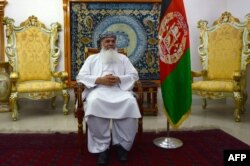Afghanistan’s Taliban says they are ready to discuss peace and reconciliation with the leaders of Afghan jihadi organizations opposed to the U.S.-led “foreign occupation” of the country.
The insurgent group made the overture through an official statement Tuesday, but maintained its silence over Afghan President Ashraf Ghani's recent offer of a reconciliation dialogue.
The statement referred to the 2001 U.S.-led military invasion of Afghanistan as an “ongoing tragedy,” and said the Taliban’s Qatar-based political office invites Afghans “who do not support the invaders, be they jihadi personalities or otherwise” to exchange views on how to end “foreign occupation,” establish an Islamic system and start a political reconciliation process in the country.
The comments were in response to an offer for peace talks by Ismail Khan, a renowned jihadi leader and former governor of the western Afghan province of Herat.
During a public address in the provincial capital last week, Khan told the Taliban that if they were not ready to engage in peace talks with the Afghan government, they should negotiate “a deal with the great family of jihad” to find a solution to the conflict. He was referring to Afghan Islamic organizations that waged jihad, or holy war, against the Soviet occupation of Afghanistan in the 1980s.
Ghani’s “comprehensive” offer promised the Taliban a political office in Kabul, issuance of passports to insurgent officials, and a cease-fire. The plan received widespread international backing, but the Taliban have yet to respond.
In repeated pre- and post-Ghani offers, the Taliban have sought direct negotiations with the United States, referring to Afghan rulers as “American puppets.”
The U.S. has said any peace and reconciliation process has to be Afghan-led and Afghan-owned.
The Afghan government warned this week that the fate of the Taliban’s so-called political office in Qatar is linked to the insurgents’ response to Ghani’s peace talks offer, suggesting Kabul may demand the facility be closed if the insurgents reject the offer.





